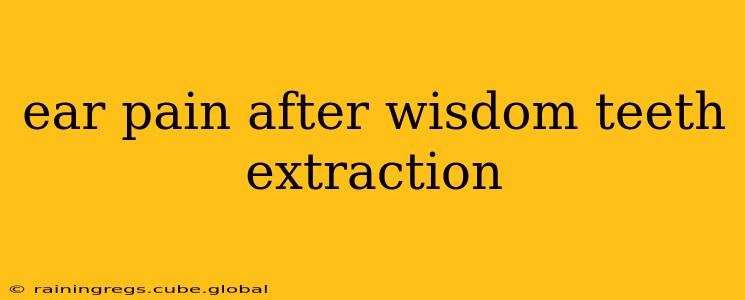Wisdom teeth extractions are common procedures, but post-operative discomfort, including ear pain, is a frequent concern. Understanding the causes, effective treatment options, and preventative measures can significantly ease the recovery process. This comprehensive guide will address common questions surrounding ear pain after wisdom teeth removal, providing you with the information you need to manage this discomfort effectively.
Why Does My Ear Hurt After Wisdom Teeth Removal?
Ear pain following wisdom tooth extraction isn't directly caused by damage to the ear itself. Instead, it's often referred pain. The nerves in your lower jaw and the area around your wisdom teeth are closely intertwined with those that innervate your ear. Inflammation, swelling, and pressure in the jaw area can easily trigger pain sensations that are felt in your ear.
Is Ear Pain Normal After Wisdom Teeth Removal?
While some mild discomfort is expected after any surgical procedure, persistent or severe ear pain warrants attention. Mild, temporary earache is often a result of swelling and pressure. However, intense pain, particularly accompanied by other symptoms like fever, increased swelling, or bleeding, may indicate a complication and requires immediate medical attention.
How Long Does Ear Pain Last After Wisdom Teeth Extraction?
The duration of ear pain varies depending on individual healing responses and the complexity of the extraction. For most people, mild earache subsides within a few days to a week as the swelling reduces. However, some individuals may experience lingering discomfort for up to two weeks. If the pain persists beyond this timeframe or worsens, consulting your oral surgeon is crucial.
What Can I Do to Relieve Ear Pain After Wisdom Teeth Extraction?
Several self-care strategies can effectively alleviate ear pain:
- Over-the-counter pain relievers: Ibuprofen or acetaminophen can help manage pain and reduce inflammation. Always follow the recommended dosage instructions.
- Ice packs: Applying ice packs to the affected area for 15-20 minutes at a time, several times a day, can help reduce swelling and numb the pain.
- Rest: Adequate rest is vital for healing. Avoid strenuous activities that could increase swelling and pain.
- Gentle rinsing: Gently rinsing your mouth with salt water can help keep the extraction site clean and promote healing. Avoid vigorous rinsing or spitting.
- Elevating your head: Sleeping with your head elevated can minimize swelling and reduce pressure on the affected area.
What Should I Do If My Ear Pain is Severe?
Severe ear pain, accompanied by symptoms like high fever, excessive bleeding, or worsening swelling, requires immediate medical attention. Contact your oral surgeon or dentist immediately. These symptoms could indicate an infection or other complications requiring prompt treatment.
Can I Fly After Wisdom Teeth Extraction With Ear Pain?
Flying after a wisdom teeth extraction, particularly when experiencing ear pain, is generally discouraged. Changes in cabin pressure during air travel can exacerbate pain and increase the risk of complications like dry socket. It’s best to wait until your pain subsides and your surgeon clears you for air travel.
When Should I See a Doctor About Ear Pain After Wisdom Teeth Removal?
Seek medical attention if your ear pain is severe, persistent (lasting more than two weeks), accompanied by fever, excessive bleeding, or increasing swelling. Don't hesitate to contact your oral surgeon or dentist—it's always better to err on the side of caution. Early intervention can prevent more serious problems.
How Can I Prevent Ear Pain After Wisdom Teeth Extraction?
While not all ear pain is preventable, following your oral surgeon's post-operative instructions meticulously can significantly reduce your risk. This includes taking prescribed medication as directed, maintaining good oral hygiene, and avoiding strenuous activities. Proper aftercare plays a crucial role in minimizing post-operative discomfort.
Disclaimer: This information is intended for general knowledge and informational purposes only, and does not constitute medical advice. Always consult with a qualified healthcare professional for any questions you may have regarding your medical condition and treatment options. The information provided here should not be used for diagnosing or treating any health problems or diseases. The views and opinions expressed in this article are those of the author and do not necessarily reflect the official policy or position of any agency, organization, employer or company.
